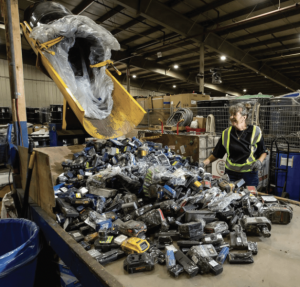New Jersey, United States — The U.S. state of New Jersey’s Electric and Hybrid Vehicle Battery Management Act has been passed and approved as of January 8, 2024, marking the first American state to create industry guidance for the recycling of lithium-ion batteries.
The act requires manufacturers to be responsible for the collection and management of used electric and hybrid vehicle batteries. These producers must fund, develop and implement a New Jersey Department of Environmental Protection-approved management plan for the collection and management of used propulsion batteries. Producers are also required to inform EV owners and vehicle repair facilities of these management plans.
The term “producers” can generally be understood, in the automotive recyclers and dismantler context particularly, as certain vehicle manufacturers, brands/trademark licensees or importers.
Producers of electric and hybrid vehicle batteries must register with the New Jersey Department of Environmental Protection no later than January 8, 2025. Beginning January 8, 2026, producers must annually report to the Department of Environmental Protection the number of batteries sold, offered for sale or distributed within the state of New Jersey.
New Jersey's Act requires that anyone authorized to handle used batteries do so under their affiliated partner(s)' plan, which raises the stakes for involved industry players like auto recyclers and dismantlers.
On January 8, 2027, battery collection and disposal restrictions take effect, including a ban on unauthorized disposal of any covered batteries as solid waste. Management plans are due 180 days after the producer adopts program regulations; the latest due date being around summer 2027. Producers must implement their plans following Department approval.
Unlike other extended producer responsibility (EPR) legislation, this new Act requires that anyone authorized to handle used batteries do so under their affiliated partner(s)’ plan, which raises the stakes for involved automotive players like auto recyclers, repair facilities and dealerships.
In Canada, British Columbia has committed to introducing EPR for EV batteries by 2026, according to the province’s EPR Five-Year Action Plan passed in 2021.


























